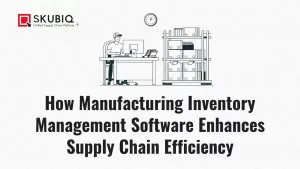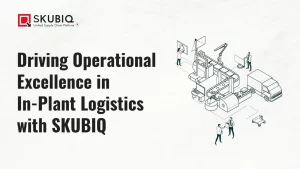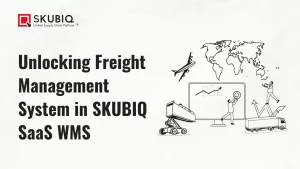Efficient supply chain management is critical for businesses seeking to maintain a competitive edge in today’s dynamic markets. One key element in achieving this efficiency is the adoption of advanced technologies, with Warehouse Management System (WMS) Software playing a pivotal role. In this article, we will explore how WMS software can be a game-changer in streamlining supply chain costs.
1. Optimized Inventory Management
One of the primary contributors to supply chain costs is inadequate Inventory Management. Overstocking ties up capital and leads to increased holding costs, while stockouts can result in lost sales and dissatisfied customers. WMS software addresses these challenges by providing real-time visibility into inventory levels and automating replenishment processes.
With accurate data on stock levels, businesses can implement just-in-time inventory practices, reducing holding costs and minimizing the risk of stockouts. This optimization directly impacts supply chain costs by ensuring that inventory is aligned with demand, preventing excess carrying costs.
2. Enhanced Order Fulfillment Efficiency
Order fulfillment is a critical aspect of the supply chain that directly influences customer satisfaction. Inefficient order-picking processes can lead to increased labor costs, picking errors, and delayed shipments. WMS software streamlines the Picking Process in Warehouses through the use of technologies like barcode scanning and automation.
By automating and optimizing the order fulfillment process, businesses can reduce labor costs, improve accuracy, and enhance the speed of order processing. This not only results in cost savings but also contributes to a positive customer experience.
3. Reduced Labor Costs through Automation
Labor costs constitute a significant portion of supply chain expenses. WMS software introduces automation into various warehouse processes, reducing the reliance on manual labor. Automated systems, such as conveyor belts, robotic arms, and automated guided vehicles (AGVs), can handle tasks like picking, packing, and shipping.
Automation not only accelerates processes but also minimizes errors, leading to cost savings associated with returns, replacements, and customer dissatisfaction. While the initial investment in automation technology may be substantial, the long-term reduction in labor costs makes it a financially sound decision.
4. Dynamic Space Utilization
Effective utilization of warehouse space is crucial for minimizing storage costs. WMS software incorporates intelligent algorithms to optimize the layout and storage of goods within the warehouse. It considers factors such as demand patterns, SKU characteristics, and picking frequencies to dynamically adjust storage locations.
By maximizing the use of available space, businesses can reduce the need for additional storage facilities, leading to cost savings in terms of rent and operational expenses. The automated nature of these adjustments ensures ongoing efficiency without the need for constant manual intervention.
5. Streamlined Supplier Relationships
Supply chain costs are not solely determined by internal processes but are also influenced by relationships with suppliers. WMS software facilitates better communication and collaboration with suppliers through features like real-time visibility into inventory levels and demand forecasting.
Improved communication allows for more accurate production planning and order fulfillment, reducing lead times and minimizing the need for expedited shipments. This, in turn, lowers transportation costs and contributes to overall supply chain cost efficiency.
6. Data-Driven Decision Making
Informed decision-making is critical for supply chain cost optimization. WMS software provides detailed insights into various aspects of warehouse operations, including order trends, inventory turnover, and labor productivity. By leveraging this data, businesses can make strategic decisions to streamline processes and reduce costs.
For example, identifying slow-moving inventory enables businesses to implement targeted promotions or adjust stocking levels. Real-time data also helps in monitoring the performance of suppliers and carriers, allowing for negotiations that can lead to cost reductions.
7. Improved Accuracy and Reduced Returns
Errors in order fulfillment not only result in additional shipping costs but also contribute to increased return rates. WMS software with advanced tracking and validation capabilities minimizes errors in the picking and packing processes, leading to fewer returns.
Reduced return rates not only save on transportation costs but also contribute to maintaining customer trust and loyalty. The streamlined processes enabled by WMS software ensure that the right products are delivered accurately, minimizing the need for costly reverse logistics.
8. Adaptability to Changing Demand
Supply chain costs can escalate when businesses struggle to adapt to fluctuating demand. WMS software equips businesses with the flexibility to scale operations up or down based on demand patterns. This adaptability prevents overcommitting resources during slow periods and helps meet increased demand without disruptions.
By aligning resources with actual demand, businesses can avoid unnecessary costs associated with excess labor, storage, and transportation. WMS software, with its predictive analytics capabilities, assists in forecasting demand trends, enabling proactive adjustments to the supply chain.
9. Compliance and Risk Management
Non-compliance with regulations and inadequate risk management can result in fines, legal issues, and supply chain disruptions, all of which contribute to increased costs. WMS software can include features that track regulatory requirements and manage risks associated with factors such as product expiration dates and safety standards.
By ensuring compliance and managing risks effectively, businesses can avoid costly penalties and interruptions in the supply chain. WMS software acts as a proactive tool for maintaining the integrity of the entire supply chain ecosystem.
10. Integration with Other Technologies
WMS software can be seamlessly integrated with other technologies, such as Enterprise Resource Planning (ERP) systems, Transportation Management Systems (TMS), and Advanced Planning and Scheduling (APS) software. This integration ensures a cohesive flow of information across the entire supply chain, eliminating data silos and improving overall efficiency.
A well-integrated technological ecosystem enables businesses to make data-driven decisions, optimize resource allocation, and enhance collaboration with suppliers and customers. This holistic approach contributes to cost savings by eliminating redundancies and inefficiencies in the supply chain.
In conclusion, Warehouse Management System (WMS) Software is a powerful tool for businesses looking to streamline supply chain costs. From optimizing inventory management and order fulfillment to reducing labor costs through automation, the adoption of WMS software brings about operational efficiencies that directly impact the bottom line. As technology continues to advance, businesses that leverage WMS software effectively will be better positioned to navigate the complexities of modern supply chain management and gain a competitive edge in the market.



